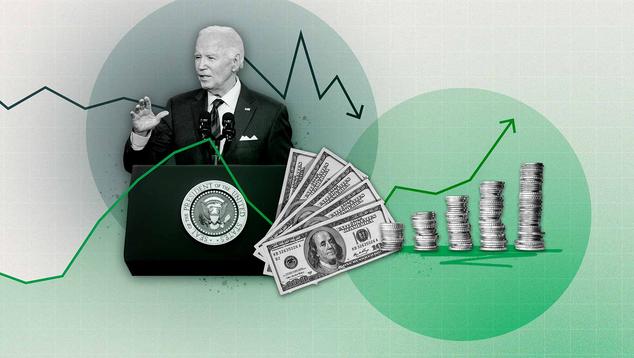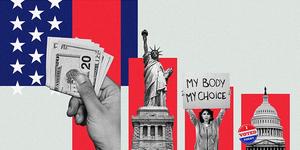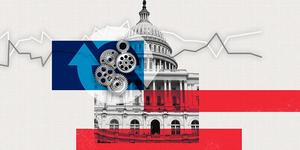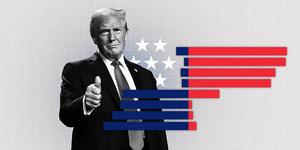WASHINGTON, D.C. -- Gallup’s first poll after the Republican sweep in the 2024 elections finds a mix of changes in key indicators of the national mood. Americans’ confidence in the economy has improved, largely because of increased optimism among Republicans, and slightly more Americans approve of Congress than did before the election. Fewer U.S. adults also name economic matters as the most important problem facing the country. Meanwhile, President Joe Biden’s job approval rating has dipped to 37%, and fewer Americans are satisfied with the way things are going in the U.S.
The results are from a Nov. 6-20 Gallup poll, which also found that Americans’ favorable ratings of President-elect Donald Trump are slightly more positive now than before Election Day, while favorability toward President Joe Biden, Vice President Kamala Harris and the Democratic Party have worsened slightly. This comes as partisans are experiencing very different emotional reactions to the election outcome.
Improved Economic Outlook, Primarily Among Republicans
Gallup’s Economic Confidence Index in November is -17, an improvement of nine points from October. The current reading is the best since a -12 reading in August 2021, when the economy continued to improve from the initial shocks of the COVID-19 pandemic. In reaction to rising inflation in late 2021 and early 2022, the index subsequently fell as low as -58 by June 2022, which was the worst reading since the Great Recession of 2007-2009.
The index summarizes Americans’ current evaluations of the U.S. economy and their perceptions of whether it is getting better or worse.
- Twenty-six percent rate the economy as excellent or good, while 32% say it is “only fair” and 40% poor. The main change in evaluations since October is a six-percentage-point drop in poor ratings.
- Thirty-six percent, up from 32% in October, believe the economy is getting better. Meanwhile, 55%, down from 62%, think it is getting worse.
Higher economic confidence is being driven primarily by Republicans, whose index score gained 29 points to -43 this month. Independents’ confidence went up nine points, to -25, while Democrats’ dropped 10 points, to +27.
These shifts are largely a function of changes in partisans’ perceptions about the outlook for the economy, likely a reaction to Trump’s election as president. Many more Republicans now view the economy as getting better, and many fewer say it is getting worse. In contrast, fewer Democrats see the economy as improving, and more see it worsening.
Gallup measured similar party shifts after the 2020 election, when Democrat Joe Biden defeated Republican Trump. By February 2021, shortly after Biden took office, Democrats’ index score was higher than Republicans’.
More Republicans, Fewer Democrats Satisfied With State of Nation
Fewer Americans are satisfied with the way things are going in the U.S. now (22%) than before the election (26%). A notable spike in Republican satisfaction (from 5% to 16%) has been more than offset by a larger decline among Democrats (from 47% to 31%) and a slight dip among independents (from 25% to 21%).
Immediately after the 2020 election, satisfaction among Republicans dropped even more steeply, from 60% to 35%, than Democrats’ did this year. Neither Democrats’ nor independents’ satisfaction levels changed after the 2020 election.
Biden Ratings Nearly Hit Bottom
Biden’s job approval rating has dipped to 37% from 41% before the election, and is just one point above his personal low registered in July, shortly before he dropped out of the presidential election race.
The decline is largely because ratings among political independents have dropped from 38% approval before the election to 32% now. Eighty percent of Democrats and 7% of Republicans approve of the job Biden is doing.
The trends in lame-duck presidents’ immediate postelection job approval ratings are mixed. Half of the 12 lame-duck presidents since 1952 had higher approval ratings immediately after the election. Three, including Biden, saw declines, and three had stable ratings.
Trump and Jimmy Carter are the other presidents who saw declines in support after an election. Both had lost their bid to serve a second term as president. Trump’s job approval rating fell slightly after the 2020 election, from 46% to 43%, and would drop even further as his lame-duck period was marked by his efforts to dispute the outcome. Carter’s job approval rating dropped from 37% to 31% after the 1980 election.
Three other presidents saw no meaningful change in their postelection job approval ratings. This includes two -- Lyndon Johnson and Harry Truman -- who, like Biden, were eligible for another term but ultimately did not pursue it. The 1968 election involving Johnson was similar to this year’s, with the incumbent president dropping out and his vice president becoming the party’s presidential nominee, but ultimately losing the election. Dwight Eisenhower was the other lame-duck president whose postelection approval rating was unchanged.
Barack Obama, George W. Bush, Bill Clinton, George H.W. Bush, Ronald Reagan and Gerald Ford all saw higher approval ratings after the election. Ford and the elder Bush had also been defeated in their reelection attempts.
The poll also finds 30% of Americans approving of Biden’s handling of foreign affairs, the lowest rating for him on the issue to date. Americans give Biden higher marks, 38% approval, for his handling of the economy. His economic approval rating has been as low as 31%, in August 2022.
Congress’ Approval Ticks Up
Nineteen percent of Americans approve of the job Congress is doing, up slightly from 16% before the election and on the higher range of ratings this year.
Political independents (whose approval has risen from 17% to 21%) and Democrats (from 19% to 24%) view Congress slightly more positively than before the election.
Top Problems Largely the Same, but Fewer Mention Economic Matters
Americans continue to focus on three issues when asked to name the most important problem facing the country, with 21% mentioning the government, 20% immigration and 17% the economy. There has been a slight shift away from the economy and toward the government in the past month. Another 11% of U.S. adults name inflation as the most important problem, down slightly from readings in October, September and August.
Economic issues as a whole -- including the economy in general, inflation and others, like the federal budget deficit -- are less top of mind to Americans when asked to name the most important problem. Last month, 43% mentioned an economic issue, compared with 33% this month. The decline is seen among all party groups, with Democrats (from 31% to 17%) and Republicans (from 52% to 41%) showing larger declines than independents (from 45% to 39%).
Bottom Line
After the election, Americans are more positive about the economy but less positive about Biden’s performance and the state of the nation. The shifts generally reflect sharp changes among one or the other partisan group, including Republicans becoming much more optimistic about the economy’s direction and Democrats less satisfied with the state of the nation after an election that gave Republicans control of the federal government’s executive and legislative branches. Republicans’ views about national conditions are likely to become increasingly positive in the coming months, while Democrats’ opinions will likely sour. Once Trump and the Republican Congress are installed in their offices in early 2025, Republicans’ assessments of the economy, state of the nation and federal leaders are expected to surpass those of Democrats.
To stay up to date with the latest Gallup News insights and updates, follow us on X @Gallup.
Learn more about how the Gallup Poll Social Series works.
View complete question responses and trends (PDF download).




